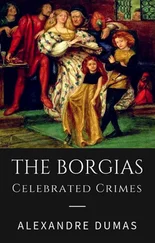Alexander VI astutely agreed immediately to pay this ransom, and the two women were sent on to Rome under an escort of four hundred soldiers. Ludovico Sforza was not pleased: ‘These ladies,’ he declared, ‘could have been used as a fine whip for compelling the Pope to do all that was required of him, for he cannot live without them. The French received a mere 3,000 ducats for them when he might well have paid 50,000 or even more to have them back.’
With the main body of the French drawing ever closer to Rome, the city grew increasingly fearful; houses and palaces of known supporters of France were ransacked. Alexander VI had been advised to escape from Rome while he could still do so; but, for the first time in his life, he seemed utterly irresolute. He had called in Neapolitan troops only to dismiss them; he had repeated his refusal to allow the French free passage through the Papal States only to rescind the order; on one occasion he fainted.
Finally the pope decided to stay in Rome and began to consider the ways in which he might secure an agreement with Charles VIII. First he set about ordering the defence of the city and summoned Burchard together with a number of other members of the German colony living in Rome to an audience, to ask for their help. He outlined the ‘insolent behaviour’ of the French king and his invasion of the Papal States; ‘he did not anticipate a siege by the French,’ he said, but would welcome any help that the German nation, ‘in whom he had great confidence,’ might be able to contribute to the defence of Rome. Burchard continued his account:
His Holiness suggested that we should appoint constables and officers… and arm them with weapons and issue all the requisite orders so that, when the time came, they would be able to defend themselves and the Pope would be able to use this militia within the city, although not outside the walls.
In the end, Burchard failed to persuade his compatriots to agree to the formation of this highly irregular militia; they felt bound, they said, to their promise to obey the captains of their neighbourhood watches, which was what usually happened in an emergency such as this. Nor was the commander of the papal troops, Virginio Orsini, cousin of the lovely Giulia’s husband, any more encouraging; he chose to offer no resistance to the French, who were, he considered, irresistible.
With characteristic style, Alexander VI announced that he would defend Castel Sant’Angelo with the troops at his disposal and, if attacked, would stand on its walls in full canonicals, carrying the Blessed Sacrament. He would not leave Rome, he said, to become a prisoner in Naples; he was determined to remain and attempt to come to terms with the French king. Work now started on a deep ditch to surround Castel Sant’Angelo, which involved the demolition of several houses. ‘On Thursday 18 December,’ wrote Burchard, ‘all the Pope’s possessions, including even his bed and daily credence-table, were assembled for removal from the Vatican Palace to Castel Sant’Angelo, the vestments from St Peter’s, all the money chests from the sacristy, the palace weapons and stores of food, and all the papal belongings were sent to the castle, whilst the cardinals also prepared to move.’
Below the walls of Castel Sant’Angelo, the city was now in an uproar as people fled into the country, having buried or otherwise hidden their valuables to save them from looters and pillaging soldiers. ‘The discontent of the people is at its height,’ wrote the Mantuan envoy Fioramonte Bagolo. ‘The looting is fearful, the murders innumerable; one hears moaning and weeping on every side and never, in the memory of man, has the Church been in such an evil plight.’ All those who could afford to do so were packing their valuables into carriages and leaving the city. Looking out through the windows of the Vatican, Alexander VI and his son Cesare watched the enemy troops massing on Monte Mario, just north of the palace, thankful that they, too, had taken the precaution of locking their treasures away in Castel Sant’Angelo and were ready for flight.
Meanwhile, as rumours spread of the atrocities that the French would inflict, Charles VIII attempted to appease the fears of the Romans. The French Cardinal Bertrand Perauld, who had been refused entry into the city on December 22, was heard to say that the troops ‘would not take a hen or an egg or the smallest item without paying for it in full.’ The next day he wrote to the German colony saying that the invasion would only happen if the king’s ‘enemies,’ by which he meant Alexander VI himself, ‘continue to remain in Rome and prevent an agreement.’ Moreover, he insisted, ‘His Majesty promises that his troops will do no harm to any prostitute in the city, nor to any other person, wherever they are from, unless they fight against the King and his followers.’
With the city almost surrounded by French troops, the celebrations for the Feast of the Nativity continued with surprising normality: Burchard recorded that the pope himself was present in the Sistine Chapel for Vespers on Christmas Eve. It had been expected that the cardinal of Monreale would celebrate High Mass in the Sistine Chapel on Christmas Day, but before dawn broke that morning, a courier had arrived with an urgent message for Alexander VI to say that Charles VIII desired a peaceful agreement with the pope prior to the king’s entry into the city. Having informed the cardinals assembled in the Sala del Pappagallo that he intended to allow Charles VIII to enter Rome, the pope dispatched the cardinal of Monreale to agree to terms with the king, who likewise sent his envoys to the Vatican for the same purpose. At Mass in the Sistine Chapel the next day, the Feast of St Stephen, Burchard faced an awkward situation, being obliged to organize seating not only for these French envoys but also for two ambassadors of the king of Naples who were in Rome:
The latter did not wish to dispute their seats with the new arrivals, and withdrew, claiming not to know who they were, but when on the Pope’s orders, I had explained to them that they were ambassadors from the King of France, the Neapolitans resumed their seats and gave the others precedence in position. A great many other Frenchman came in as well, and sat down quite indiscriminately next to the clerics on their benches. I moved them away and gave them more suitable places, but the Pope disliked what I was doing and summoned me angrily to say that I was destroying all his efforts and that I was to permit the French to stand wherever they wanted. I responded in a soothing manner, saying that God knew, he was not to become upset over the issue because I understood what he wanted and would speak not another word to the Frenchmen, wherever they sat in the chapel.
On December 31 Alexander VI sent his master of ceremonies to Charles VIII: ‘On the orders of His Holiness,’ Burchard wrote, ‘I rode out to find the King of France in order to acquaint him with the ceremonial that would accompany his reception in the city and to hear his own wishes and to do all His Majesty ordered me to do.’ Because of the pouring rain, the roads clogged with mud, ‘and the speed at which His Majesty was riding,’ Burchard was unable to greet the king as formally as he would have wished. In answer to Burchard’s questions, Charles VIII replied ‘that he wanted his entry into the city to be conducted without any pomp.’ He did, however, invite the master of ceremonies ‘to continue riding with him, and for about four miles or so he talked with me continually, asking me questions about the health of the Pope and the cardinals.’ Burchard noted the king’s particular interest in Alexander VI’s son Cesare, asking many questions about his situation and his status ‘and many other things, to all of which I was scarcely able to give appropriate answers.’
Читать дальше











